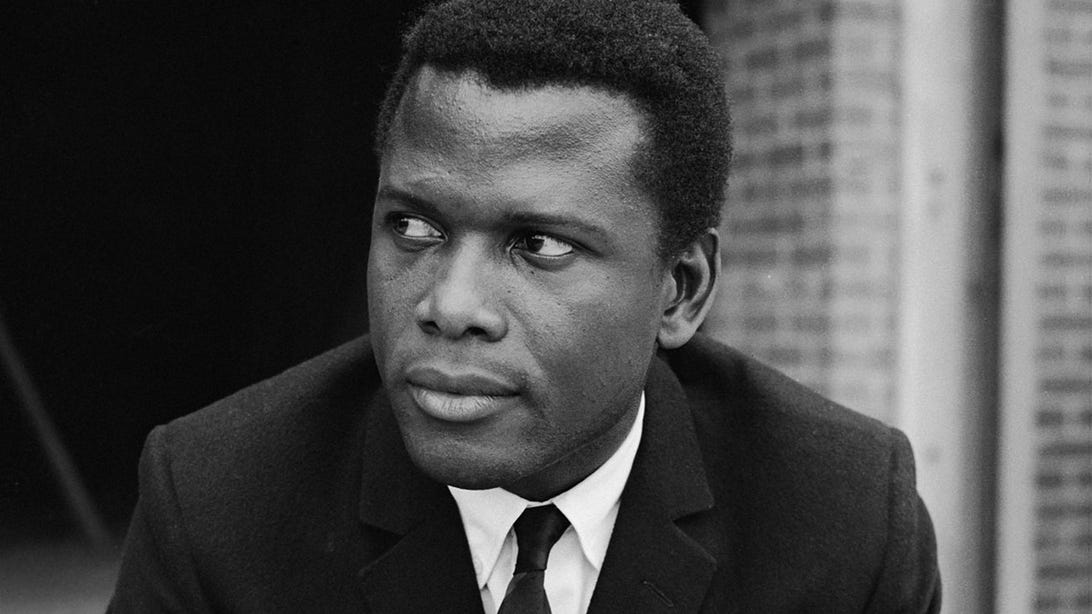Join or Sign In
Sign in to customize your TV listings
By joining TV Guide, you agree to our Terms of Use and acknowledge the data practices in our Privacy Policy.
Groundbreaking Actor Sidney Poitier Dead at 94
Poitier was the first Black man to win the Oscar for Best Actor

Sidney Poitier
Universal History Archive/Universal Images Group via Getty ImagesRenowned actor and director Sidney Poitier has died. He was 94 years old.
Poitier passed away on Thursday. His death was confirmed by the office of the prime minister of the Bahamas.
With a career spanning more than 50 years across stage, film, and television, the Bahamian American Poitier helped break the color barrier for Black actors by choosing to play complex characters that didn't adhere to racial stereotypes. His memorable works include the groundbreaking 1967 comedy Guess Who's Coming to Dinner, the 1959 stage production of Lorraine Hansberry's A Raisin in the Sun, and 1967's In The Heat Of The Night, in which he played the outspoken detective Virgil Tibbs. His legacy was solidified in 1964 when he became the first Black actor and first Bahamian man to win the Oscar for Best Actor for his work in the drama Lilies of the Field.
Poitier was also a political activist who attended the March on Washington alongside Martin Luther King Jr., James Baldwin, and Harry Belafonte.
Born unexpectedly on Feb. 20, 1927, in Miami, Florida, while his parents were there on a visit, Poitier grew up in extreme poverty on Cat Island in the Bahamas. After falling in love with cinema, he moved back to Miami at 15 years old but left the Sunshine State months after an encounter with the Ku Klux Klan. Poitier eventually made his way to New York City to work for the American Negro Theater. However, his first audition was a disaster due to his difficulty reading the script and his thick Bahamian accent. Determined to succeed, Poitier taught himself to read by studying magazines, mimicked American broadcasters to lose his accent, and worked as a janitor at the American Negro Theater in exchange for acting lessons. His second audition was a success, and he became an understudy for Harry Belafonte.
Poitier's first major role on screen came in the 1950 film No Way Out, in which he played a doctor operating on a racist patient who dies, setting off a race war in a small town. The film led to other work, including the 1951 drama Cry, The Beloved Country and 1955's Blackboard Jungle. In 1959, he broke ground as the first African American to be nominated for an Oscar for Best Actor when he received a nod for his role in The Defiant Ones.
Poitier made his directorial debut with the 1972 Western Buck and the Preacher, which he also starred in opposite Belafonte. He went on to direct eight other films, including Uptown Saturday Night, starring Belafonte, Richard Pryor, and Flip Wilson, along with 1980's Stir Crazy, starring Pryor and Gene Wilder. Stir Crazy made history as the highest grossing film by a Black director until Keenen Ivory Wayans broke the record in 2000 with Scary Movie.
After a decade-long break from acting, Poitier returned to the big screen opposite Tom Berenger and Kirstie Alley in the 1988 film Shoot to Kill. He went on to play Nelson Mandela in the 1997 film Mandela and de Klerk. His last role was in the 2001 TV movie The Last Brickmaker in America.
Over the years, Poitier garnered many accolades, including an honorary Oscar for his outstanding contributions to American cinema in 2002. Barack Obama awarded him the Presidential Medal of Freedom in 2009.
Potier is survived by his wife Joanna Poitier; children Sydney Tamiia Poitier, Anika Poitier, Pamela Poitier, Beverly Poitier-Henderson, Sherri Poitier, and Gina Poitier; and many grandchildren.

Sidney Poitier
RBD/Ullstein Bild via Getty Images